You’re not the only one with the Hyundai Equus air suspension problems; many people with the same car have noticed it’s not as comfortable to ride in because of these issues. These problems can be small and annoying or big and need to be fixed right away.
Knowing what signs to look for and how to fix them can help make your car ride smooth again. Let’s look at why your car might not be driving as nicely as it should and what you can do to fix it.
Common Air Suspension Problems in the Hyundai Equus
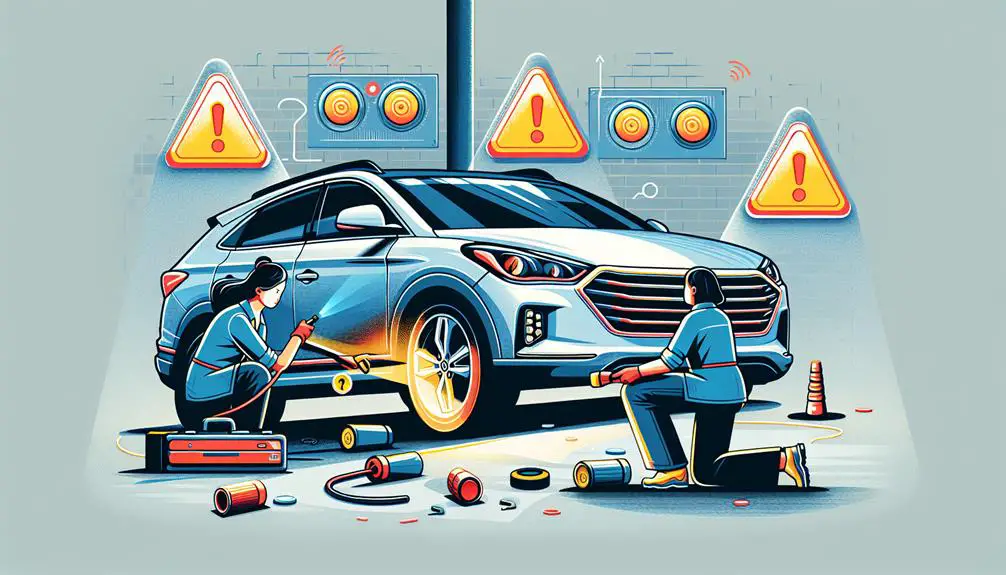
You might notice your Hyundai Equus doesn’t sit quite right, with uneven ride height or sagging corners being telltale signs of air suspension issues.
Compressor problems can lead to abnormal noises and further ride height inconsistencies, while leaks in the air springs might be the hidden culprits behind these frustrations.
These common issues highlight the need for a thorough check and potential repair strategies to keep your ride smooth and level.
1. Uneven Ride Height
A common problem with the Hyundai Equus is when one side of the car is lower than the rest. This is often because a height sensor is broken. This issue can make your car unbalanced, leading to a rough ride and possible damage to the suspension system over time.
This isn’t just about how the car looks; a car with uneven height can be harder to control and less safe. It’s important to fix this problem quickly to avoid more issues. The broken sensor can give wrong readings, making the air suspension system adjust the car’s height incorrectly.
Checking and replacing this sensor if needed is important for keeping your Equus running smoothly and comfortably.
2. Sagging Corners
Dealing with sagging corners is essential after fixing ride height problems. This often happens because of problems with sensors or computer errors in the Hyundai Equus air suspension system. You might see your car leaning to one side. This can make your car look bad and also affect how it drives and its safety. Here’s an easy way to understand and spot issues with sagging corners:
- If your car sags when parked, it could be due to bad sensors or computer problems.
- An uneven ride height might be caused by damaged sensors.
- If the display isn’t accurate, it might be because of computer malfunctions.
- Performance problems could be due to issues with sensors or the computer.
- Safety might be at risk because of faulty system monitoring parts.
Fixing these problems quickly can help avoid more damage and make your car drive smoother and safer.
3. Compressor Issues
Compressor problems in the Hyundai Equus air suspension system can affect how high your car sits and how comfortable it feels to drive.
If you hear strange noises or notice that the height of your car isn’t staying the same, it could mean the compressor isn’t working right. The compressor is important because it pumps air into the suspension bags to keep your ride smooth and even.
Issues with the compressor are a common reason why the air suspension system in the Hyundai Equus might fail.
This can happen because of normal wear and tear or damage over time. If you’re having these issues, it’s important to check the compressor, the power supply, fuses, and for any leaks or damage.
Fixing these issues quickly can help keep your car’s luxurious feel and stop more damage to the air suspension system.
4. Air Spring Leaks
Moving on from issues with the compressor, it’s important to talk about air spring leaks because they really affect how your Hyundai Equus’s suspension works, making the ride less comfortable.
These leaks can make the suspension lower, which isn’t good for the car or your comfort. To find leaks, spray soapy water on the air springs. If bubbles appear, there’s a leak. This easy test can prevent bigger problems later.
Don’t ignore these leaks. They can make things worse and more expensive to fix. Fixing air spring leaks quickly is best for keeping your Equus running well and making sure your ride is smooth.
Why Does the Hyundai Equus Experience Air Suspension Issues?
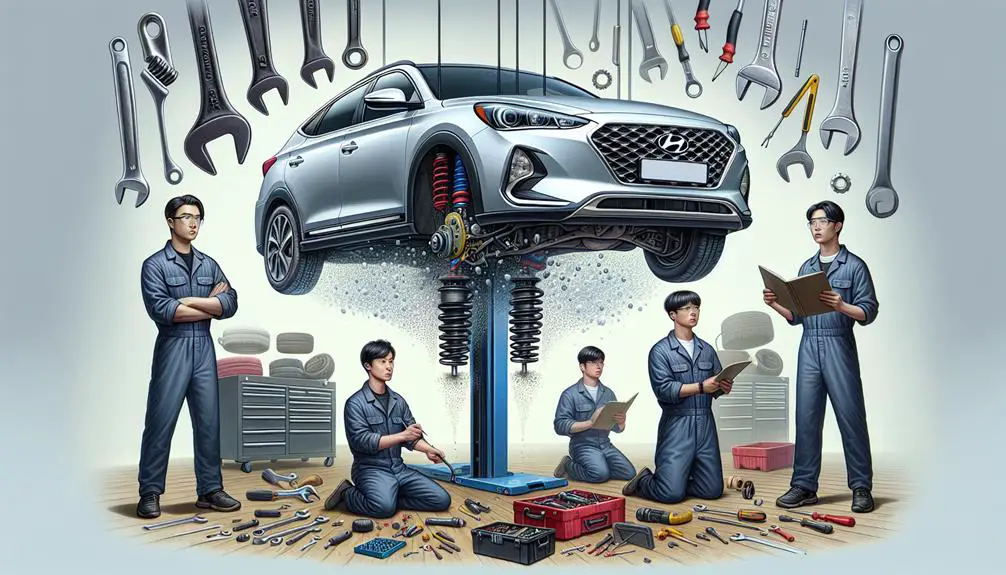
The Hyundai Equus experiences air suspension issues due to its system’s complexity and the wear and tear on components like air springs, ride height sensors, and the air compressor.
This system depends on a network comprising air bags, sensors, and electronic controls, where a fault in one part can cause a domino effect, leading to stress and failure in other parts.
The air springs and ride height sensors, essential for maintaining a balanced ride height and vehicle stability, are especially susceptible to deterioration over time.
They’re continuously exposed to road debris, temperature changes, and the natural wear from driving.
The air compressor, vital for maintaining the system’s pressure by keeping it inflated, can also wear out from constant use, resulting in noises, leaks, or failure to maintain pressure.
Additionally, the electronic control module, which functions as the system’s brain, can experience malfunctions, leading to inaccurate readings and adjustments.
This can make the ride uneven or cause the suspension to act unpredictably. Beyond physical wear and tear, software or electrical problems can further compromise the system’s performance.
Warning Signs of Air Suspension Failure in Hyundai Equus
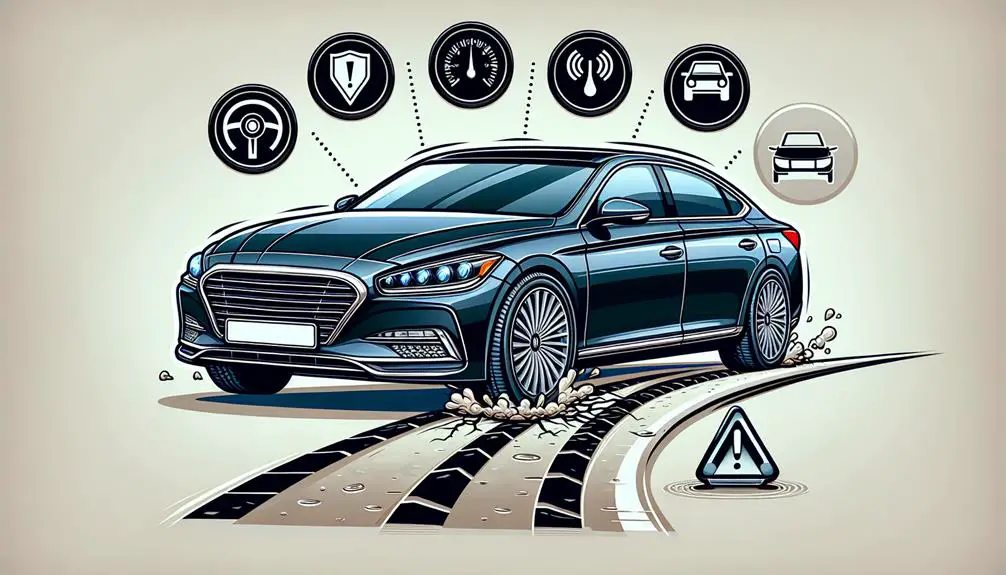
If you own a Hyundai Equus, it’s crucial to stay alert for signs of air suspension failure to prevent further damage to your vehicle. Recognizing these symptoms early can save you time and money on repairs. Here are the key signs you should watch out for:
- A noticeable drop in one corner or side of the vehicle when parked
- Hearing unusual noises from the air compressor or suspension system
- The vehicle struggling to maintain a consistent ride height
- An increase in uneven tire wear, pointing towards an imbalance in the suspension
- Warning lights or messages on the dashboard related to the suspension system
How to diagnose air suspension issues
To correctly find air suspension problems in your Hyundai Equus, watch out for key signs like different heights of the car and unusual noises. If one side of your car looks lower, it usually means the suspension is having issues, possibly due to broken sensors or computer problems.
If you hear odd noises from the compressor, it might be failing, which affects how high your car sits and how comfortable it’s to ride in. Also, check if your tires are wearing out unevenly; this can indicate suspension issues. These symptoms can make driving worse and lead to bigger problems if not fixed.
Pay attention to these signs.
How to Fix Air Suspension Problems in Hyundai Equus
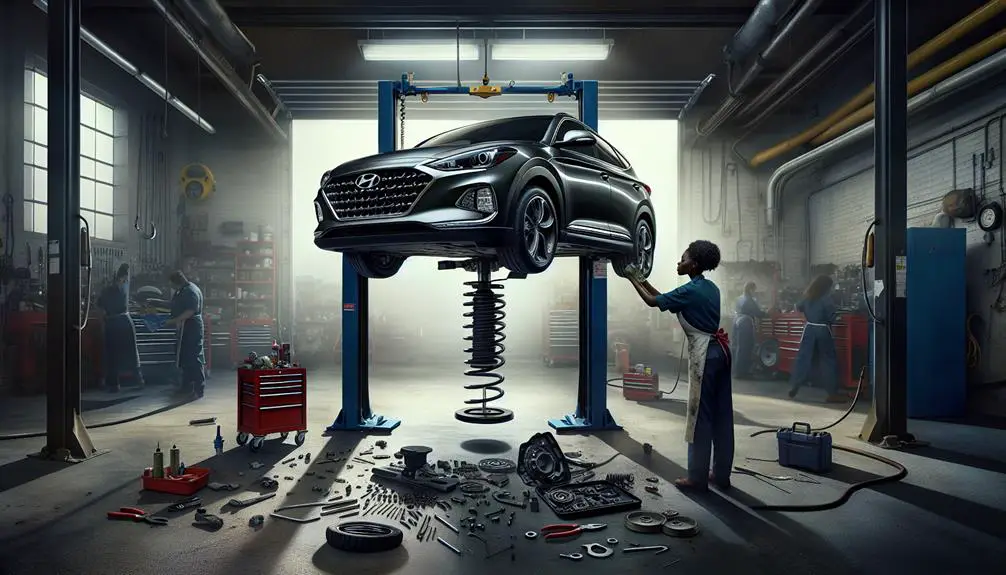
To fix air suspension problems in a Hyundai Equus, follow these steps in a clear way:
Step 1: Start by checking the height sensors and air springs, which are common parts that can wear out or fail. This can cause the car to not sit evenly and sag. Look for any signs of damage or leaks on these parts.
Step 2: Next, check the air compressor and control module. These are key parts of the air suspension system. A broken compressor can make noises or stop adjusting the ride height. A problem with the control module can make the suspension act oddly. Make sure the compressor has power and try resetting the control module by unplugging the battery. This might fix small issues.
Step 3: If problems continue, you might need to replace old parts. Use original parts or high-quality alternatives to make sure they work well and last long. Make sure to follow the instructions for installing new parts to prevent more issues.
Step 4: After fixing or replacing parts, recalibrate the system to make sure everything works together properly and the car sits at the right height. You might need special tools or a professional’s help for this step, but it’s important for making the air suspension work right.
When to seek professional help
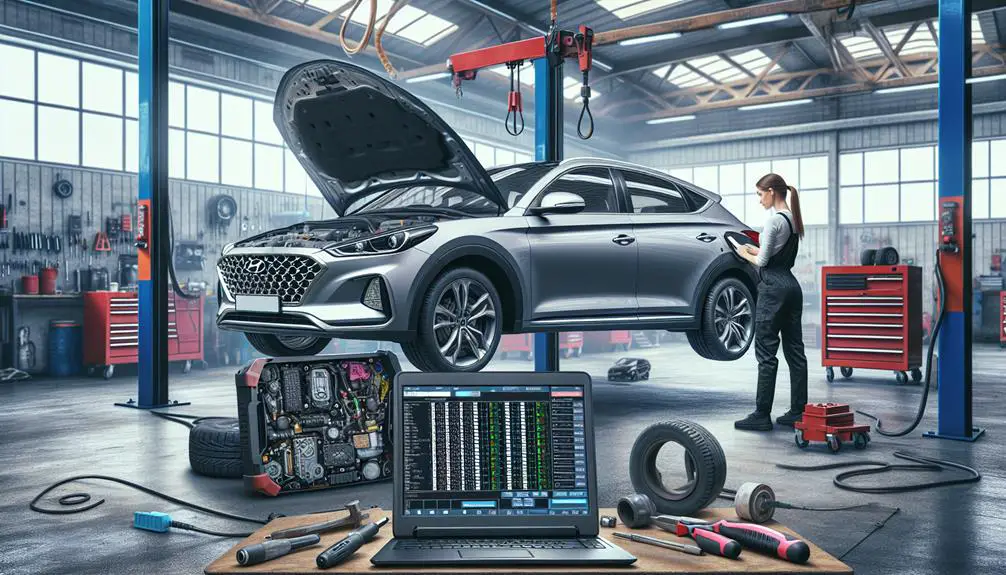
Seek professional help if issues persist after DIY attempts.
If you’ve followed the troubleshooting steps for your Hyundai Equus air suspension problems, such as resetting the system, checking for leaks, and replacing damaged parts, but still face issues, it’s crucial to consult an expert.
Signs like ongoing uneven ride height, constant unusual sounds, and frequent compressor failures suggest more complex problems that likely need specialized skills and tools for proper diagnosis and repair.
Additionally, if the thought of handling advanced components like the air springs or electronic control module makes you uneasy or if you’re uncertain about the procedure, it’s best to turn to a professional to avoid further damage or safety hazards.
Cost of Repairing Air Suspension in Hyundai Equus
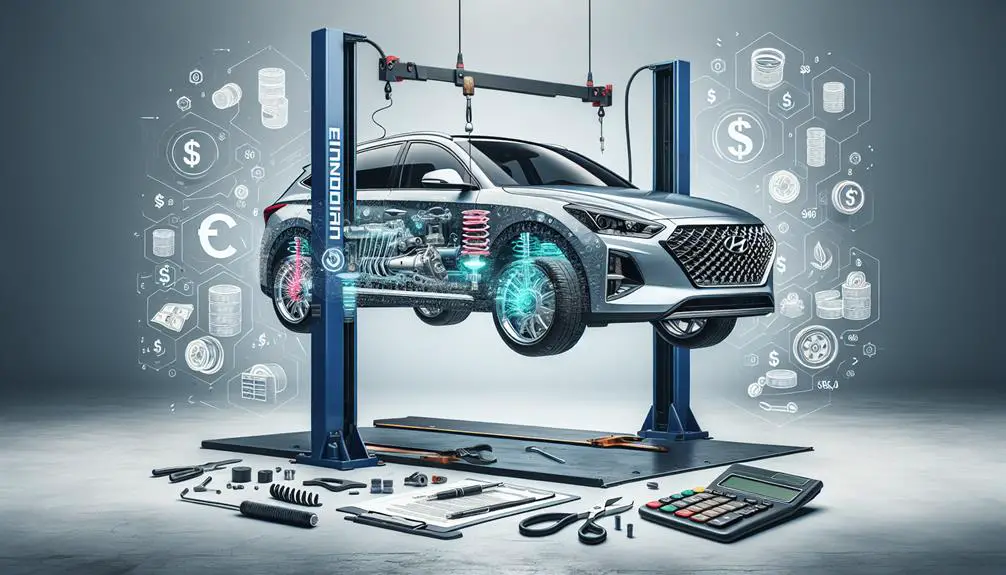
Fixing the air suspension in a Hyundai Equus can cost differently depending on how serious the problem is and which parts need to be changed.
For smaller issues like a broken height sensor or a part of the car sitting too low, the price might range from a few hundred dollars to around two thousand dollars.
This price includes both the parts and the work needed to fix it.
For bigger problems, such as a broken compressor or issues with the electronic control module, the costs can increase significantly.
For example, replacing the air compressor could cost between $1,000 and $1,500, including the work to install it.
Problems with the electronic control module might cost more than $2,000, especially if the system needs recalibration or if there are other issues that need to be fixed.
If the air suspension system has many parts that fail at once, the repair could become very expensive, possibly over $3,000.
This kind of repair might involve changing air springs, sensors, and maybe the compressor, along with many hours of work to find out what’s wrong, replace parts, and check that everything works correctly afterward.
It’s very important to have a professional check your car’s air suspension system to know exactly what’s wrong.
After that, you can get a more accurate idea of how much it will cost to fix. Keep in mind, these costs are just estimates, and the actual price can change depending on where you are, how much the mechanic charges, and the exact parts your car needs.
Tips for saving money on air suspension repairs
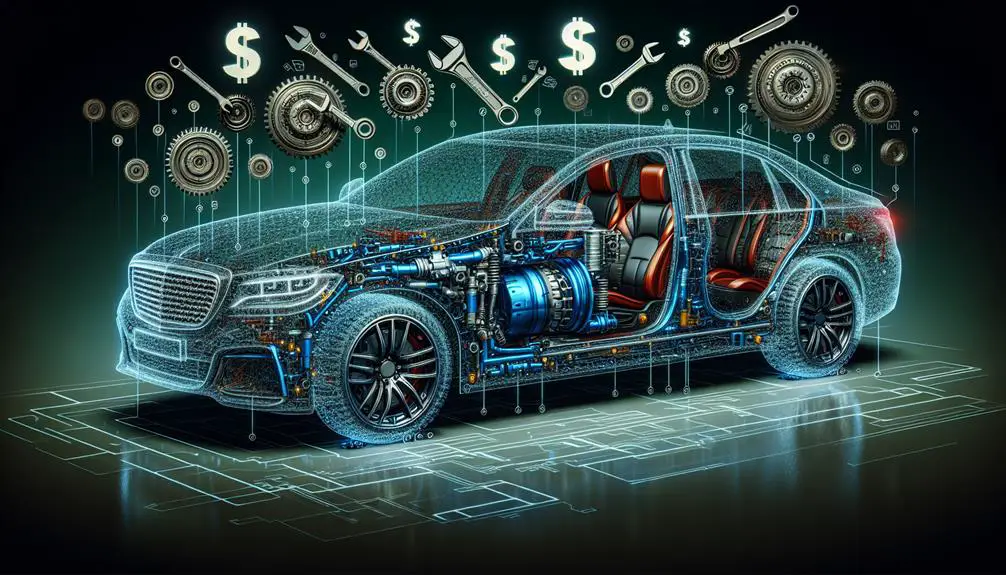
- Identify the Problem Accurately: Before spending on parts, ensure you’ve correctly diagnosed the issue to avoid unnecessary expenses. Focus on common problems like air springs and the compressor.
- Conduct Home Checks: Perform simple checks at home, such as inspecting for leaks or listening for the compressor’s operation. This can help pinpoint the problem without professional intervention.
- DIY Repairs: If you’re confident, undertake some repairs yourself. Utilize online tutorials for guidance on straightforward tasks like changing sensors or air springs, saving on labor costs. Ensure you have the appropriate tools and skills.
- Choose Quality Parts: Opt for parts that balance quality and price. While the cheapest options might be tempting, reliability and performance are key. Aftermarket parts from reputable brands can offer the same quality as original parts but at a lower cost.
Preventing Air Suspension Problems in Hyundai Equus
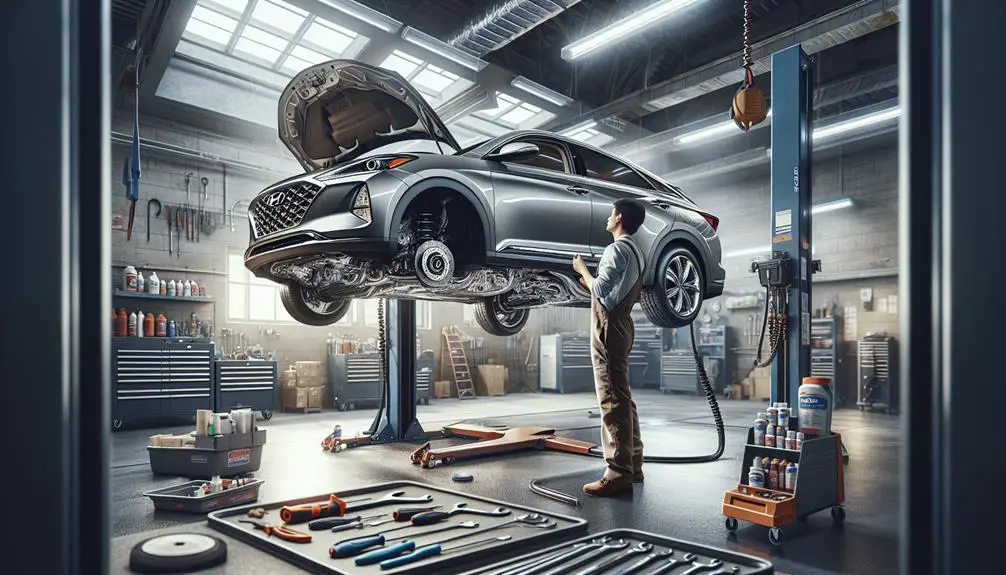
Keeping your Hyundai Equus’s air suspension in good shape can help avoid common problems and extend its life. Taking regular care can save you the trouble and cost of air suspension failures. Here’s how to ensure your Equus continues to provide a smooth ride:
- Check Regularly: Have regular inspections to look for wear or damage on the air springs, compressors, and sensors. Catching small issues early can stop them from becoming big, expensive problems.
- Listen for Sounds: Be alert to any strange sounds from the suspension, like hissing or grinding. These sounds can mean there are leaks or parts failing that need quick action.
- Watch Ride Quality: If your car starts leaning to one side or the ride feels rougher than usual, it’s time to check the air suspension. Also, if tires wear unevenly, it might indicate suspension troubles.
- Don’t Overload: Your Equus has a weight limit it can safely carry. Going over this limit can harm the air suspension system by causing it to wear out faster. Always stick to the recommended weight limits.
- Get Professional Checks: Even with your own upkeep, it’s good to have a professional mechanic or a Hyundai specialist look at your air suspension system occasionally. They might find problems you didn’t see and can make sure everything is working right.
Professional vs. DIY: What’s Best for Your Hyundai Equus Air Suspension?
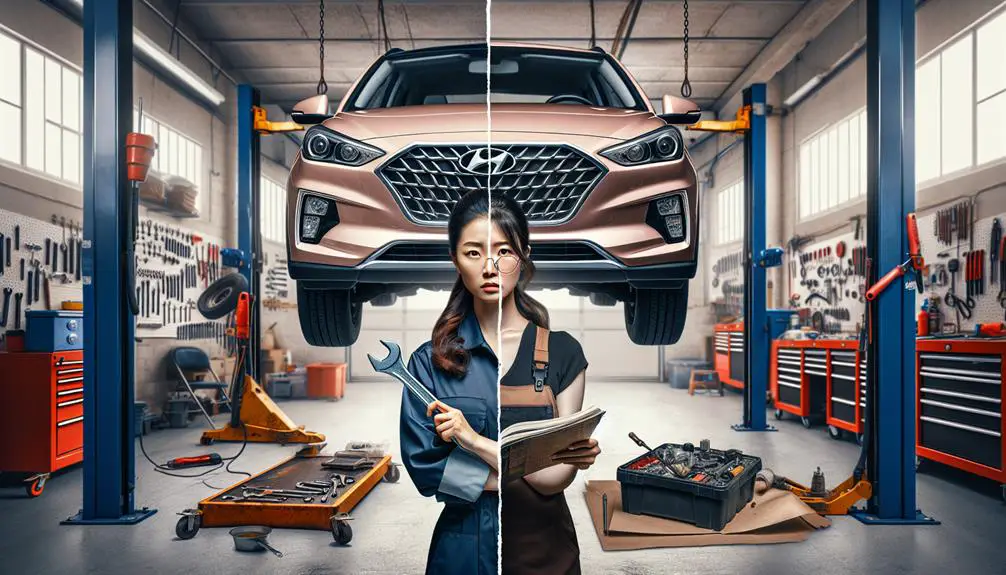
Deciding whether to fix your Hyundai Equus air suspension by yourself or hire a professional depends on your skills, available time, and budget.
Choosing a professional means you’re getting their expertise and experience. Mechanics skilled in air suspension systems, especially those who know Hyundai models well, can find and fix problems accurately.
This option might be more expensive initially, but it can prevent further costly mistakes and damage.
However, if you’re good with cars and have the right tools, doing it yourself can save money and be satisfying. It helps you learn more about your car and feel proud of your work. But, it’s important to know your own abilities well.
Air suspension systems are complicated, and a small error can cause bigger problems. If you choose to do it yourself, ensure you have a good guide or tutorial and access to quality parts.
Some tasks, like changing air springs or resetting the suspension, might seem easy. But others, like fixing electronic control module issues or adjusting ride height sensors, need special tools and knowledge.
FAQs
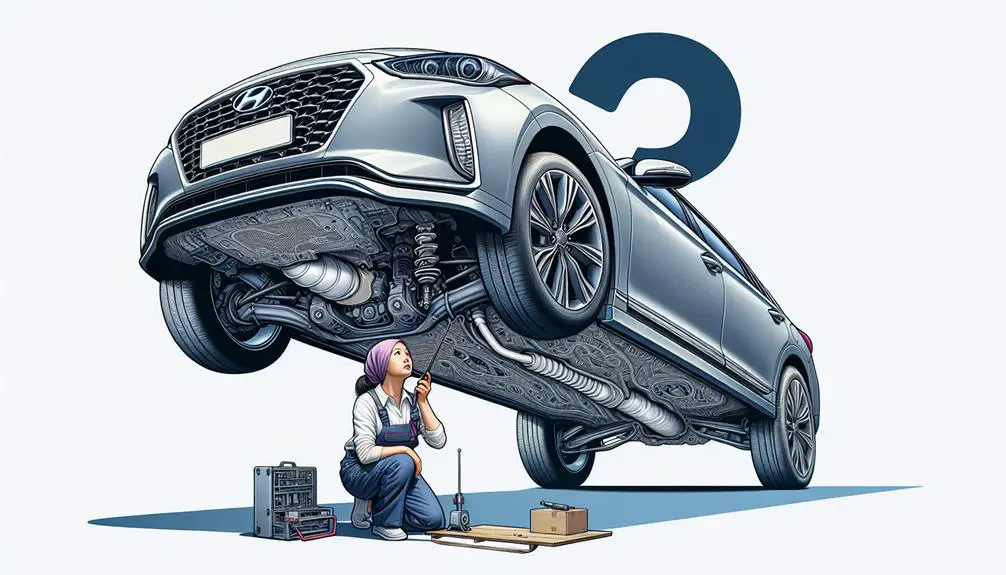
What is the lifespan of the Hyundai Equus air suspension components?
The lifespan of Hyundai Equus air suspension components is typically 5 to 10 years, influenced by maintenance, driving conditions, and usage frequency.
Regular checks and adherence to maintenance schedules are essential for longevity.
Can I replace the air suspension with a traditional suspension system?
Yes, converting your Hyundai Equus from an air suspension to a traditional coil spring system is feasible.
Conversion kits are designed for a proper fit, offering a reliable and cost-effective solution.
How do I know if my Hyundai Equus air suspension is failing?
Signs of failing air suspension in your Hyundai Equus include:
- Uneven ride heights
- Abnormal noises
- Sagging suspension or inconsistent ride quality
- Suspension system warning light on the dashboard
It is crucial to address these signs promptly to prevent further damage to your vehicle.
Are there any recalls related to Hyundai Equus air suspension problems?
No, Hyundai hasn’t issued recalls specifically for the Equus air suspension problems.
It’s important to stay updated on recall information and consult a certified technician for any air suspension issues.
Are the Air Suspension Problems in the 2014 Hyundai Equus the Same as the General Air Suspension Problems in the Hyundai Equus?
Yes, the air suspension problems in the 2014 Hyundai Equus are similar to the general air suspension issues in the Hyundai Equus. However, there are specific hyundai equus air suspension solutions available to address these issues and ensure smoother rides for the owners.
Wrapping Up
If your Hyundai Equus starts having air suspension problems, like sinking low or making weird sounds, it’s important to fix it fast. You might think about fixing it yourself or getting a professional to do it.
Knowing why it’s happening and what it looks like can save you time and money. It’s good to regularly check and fix things early to avoid bigger problems.
If you’re not sure what to do, it’s best to ask an expert to help keep your car running smoothly.